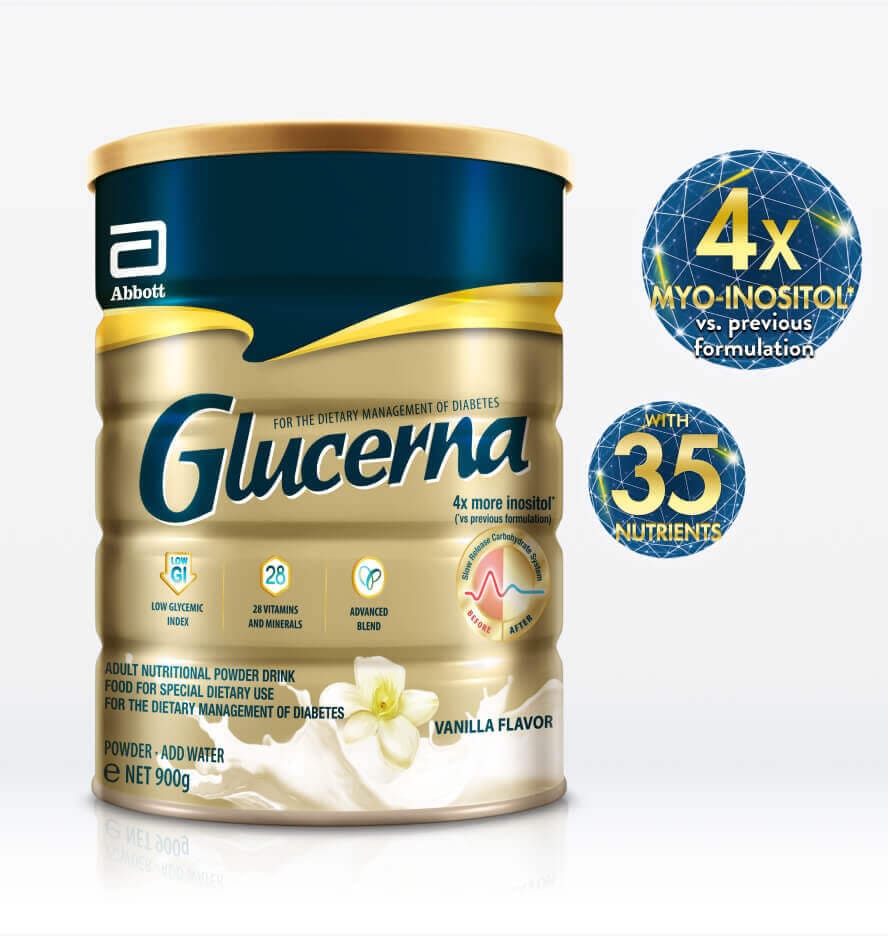Glucerna Vanilla Flavor
- Title
- Glucerna® Vanilla Flavor
- Detail Page Path
Here’s a simple primer on fats to help you make better choices.
1. Enjoy the good fats
Unsaturated fats are a healthy type of fat. The American Heart Association(AHA) recommends that the majority of the fats that you eat should be monounsaturated or polyunsaturated. Thus, aim to replace less healthy fats like saturated fats and trans fats with unsaturated fats like monounsaturated fats (MUFAs) and polyunsaturated fats (PUFAs).
MUFAs are good fats that can help reduce ‘bad’ cholesterol levels in your blood which in turn helps lower your risk of heart disease and stroke. For people with diabetes, research has also shown MUFA to benefit insulin levels and blood sugar control. Rich sources of MUFA include olive oil, nuts (e.g., almonds, cashews, pecans, and macadamias), canola oil, and avocados. The two main types of PUFAs are omega-6 polyunsaturated fats and omega-3 polyunsaturated fats. Research has shown that consumption of omega-3 fats can help improve blood cholesterol levels, which may reduce the risk for heart disease. Such fats are beneficial for those with diabetes who are at risk for heart problems. Rich sources of omega-3 fats include fatty fish (salmon, sardines, and mackerel), seeds (e.g., flaxseeds, chia seeds), nuts (e.g., walnuts, pine nuts), avocados, and dark green leafy vegetables (e.g., kale, spinach).
Despite these benefits, one should still only consume such ‘good’ fats in moderation as all fats, including MUFAs and PUFAs, are concentrated sources of calories. In general, it is recommended that fat should make up about 25-30% of our total energy intake1. Based on a typical 2000 kcal diet, the total fat allowance is about 55 to 65 g a day.
2. Limit the 'bad' fats
Saturated fats and trans fats are considered 'bad' fats. Saturated fats elevate cholesterol levels, particularly LDL cholesterol and thereby increase your risk of heart disease and stroke. Replacing foods that are high in saturated fat with healthier options can help lower blood cholesterol levels and improve blood lipid profile. Saturated fats occur naturally in many foods, especially meat and dairy products. Sources include fatty beef, poultry skin, butter, dairy products made from whole or reduced-fat (2 percent) milk, as well as fried foods. Palm and coconut oils are also common sources of saturated fat.
Trans fats raise ‘bad’ (LDL) cholesterol levels and ‘good’ (HDL) cholesterol levels and increase your risk of developing heart disease and stroke. There are two broad types of trans fats found in foods: naturally occurring and artificial trans fats. Natural occurring trans fats are found in small amounts in some meat and dairy. Artificial trans fats are found in processed foods such as butter, shortening and commercial deep-fried food and pastries. Avoid animal trans fats by reading food labels and looking for partially hydrogenated vegetable oil or shortening in the ingredients list.
To eat a healthier diet, use less oil in your food and opt for steaming or baking instead. Replace “pancit” with the soup version for your next meal in food courts. Say no to “turon” and switch to soybean pudding (less sugar!). If you want to step up the challenge, occasionally swap meat with beans for your protein.
Our bodies have lots of dietary requirements to meet, and sometimes, it's hard to fulfill all of them, especially if we have dietary restrictions due to conditions such as diabetes. Always start small! If you are looking for a quick fix for individuals with diabetes, consider using a diabetes-specific formula. Such formulas are specially formulated to contain beneficial fats like MUFA and omega-3 and 6 fats, while being low in Glycemic Index. Being able to provide complete and balanced nutrition, it's possibly the most convenient solution for a meal replacement or supplement without compromising on flavor or your health! Nonetheless, always consult your doctor or dietitian to carefully incorporate this into your diet.
So, remember, simple daily choices can make a big difference. Take a step in the right direction today!
1 Singapore Health Promotion Board
Qian F et al. Diabetes Care 2016;39:1448–1457
While there is no cure for diabetes, many treatments are available to help control blood glucose levels.
Making smarter choices you can be in control of your diabetes.
Get to know diabetes do’s and don’ts.
Glucerna® is the number 1 selling diabetes nutritional supplement in the world*. It contains 35 nutrients, slow-release carbohydrates and 4x more inositol vs previous formulation, that delivers a dual action for tight blood sugar control.
* Euromonitor International Limited; total global retail sales in 2023 for diabetic diet enhancer drinks that are not marketed as a meal replacement product. Euromonitor and Abbott calculation based in part on custom research conducted between October and November 2023 and Euromonitor Passport Consumer Health 2023 based on 2022 data.

PH.2025.67670.GLU.1
You are about to exit for another Abbott country or region specific website.
Please be aware that the website you have requested is intended for the residents of a particular country or region, as noted on that site. As a result, the site may contain information on pharmaceuticals, medical devices and other products or uses of those products that are not approved in other countries or regions.
The website you have requested also may not be optimized for your specific screen size.
Do you wish to continue and exit this website?